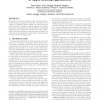Free Online Productivity Tools
i2Speak
i2Symbol
i2OCR
iTex2Img
iWeb2Print
iWeb2Shot
i2Type
iPdf2Split
iPdf2Merge
i2Bopomofo
i2Arabic
i2Style
i2Image
i2PDF
iLatex2Rtf
Sci2ools
101
click to vote
TOCS
2012
2012
A File Is Not a File: Understanding the I/O Behavior of Apple Desktop Applications
We analyze the I/O behavior of iBench, a new collection of productivity and multimedia application workloads. Our analysis reveals a number of differences between iBench and typical file-system workload studies, including the complex organization of modern files, the lack of pure sequential access, the influence of underlying frameworks on I/O patterns, the widespread use of file synchronization and atomic operations, and the prevalence of threads. Our results have strong ramifications for the design of next generation local and cloud-based storage systems.
Complex Organization | Multimedia Application | Programming Languages | System Workload | TOCS 2012 |
| Added | 27 Sep 2012 |
| Updated | 27 Sep 2012 |
| Type | Journal |
| Year | 2012 |
| Where | TOCS |
| Authors | Tyler Harter, Chris Dragga, Michael Vaughn, Andrea C. Arpaci-Dusseau, Remzi H. Arpaci-Dusseau |
Comments (0)

